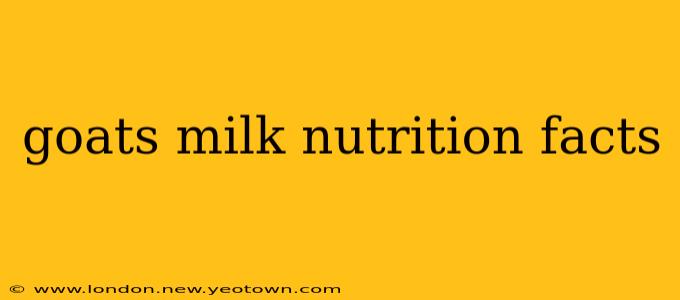For centuries, goat milk has been a staple in many cultures, prized not only for its distinctive taste but also for its purported health benefits. But what exactly makes goat milk so special from a nutritional standpoint? Let's delve into the creamy world of goat milk nutrition facts and uncover why it's gaining popularity as a dairy alternative.
Imagine a sun-drenched hillside, dotted with happy goats grazing contentedly. Their milk, the product of this idyllic scene, is richer and more complex than you might expect. It's not just a simple swap for cow's milk; it offers a unique nutritional profile that caters to various dietary needs and preferences.
What are the Nutritional Benefits of Goat Milk?
Goat milk boasts a compelling nutritional profile, offering a blend of vitamins, minerals, and proteins that contribute to overall well-being. It's naturally lower in lactose than cow's milk, making it potentially easier to digest for those with lactose intolerance. However, it's crucial to remember that while lactose content is lower, it's not entirely absent; those with severe lactose intolerance may still experience some discomfort.
The nutritional composition can vary depending on factors like the goat's breed, diet, and overall health. However, generally, goat milk provides a good source of:
- Protein: Essential for building and repairing tissues.
- Calcium: Crucial for strong bones and teeth.
- Potassium: Important for maintaining healthy blood pressure.
- Vitamin A: Supports vision and immune function.
- Riboflavin (Vitamin B2): Contributes to energy production.
Is Goat Milk Easier to Digest Than Cow's Milk?
Why some people find goat milk easier to digest:
This is a frequently asked question, and the answer is nuanced. Goat milk has smaller fat globules compared to cow's milk. These smaller globules are thought to make the milk easier to digest for some people, particularly those with mild lactose intolerance. Additionally, the protein structure in goat milk differs slightly from cow's milk, potentially contributing to better digestibility. However, it is not a guarantee that everyone with lactose intolerance will tolerate it.
Is it lactose-free?
No, goat milk is not lactose-free, though it generally contains less lactose than cow's milk. The exact amount of lactose varies, depending on the goat's breed, diet, and processing methods. People with severe lactose intolerance might still experience digestive upset.
How Does Goat Milk Compare to Cow's Milk?
Let's compare goat milk and cow's milk side-by-side:
| Nutrient | Goat Milk | Cow's Milk |
|---|---|---|
| Fat | Higher (depending on breed) | Variable |
| Protein | Similar | Similar |
| Lactose | Generally lower | Higher |
| Calcium | Similar | Similar |
| Potassium | Similar | Similar |
| Vitamin A | Similar or slightly higher | Variable |
It's important to note that these are general comparisons; the exact nutritional content can vary widely depending on various factors.
What are the potential health benefits of goat milk?
While research is ongoing, some studies suggest potential health benefits associated with goat milk consumption. These potential benefits are often linked to its nutritional profile and easier digestibility for some. However, more extensive research is needed to confirm these benefits definitively.
Is Goat Milk Good for Babies?
Goat milk is not recommended as a primary source of nutrition for infants. Infant formula is specifically designed to meet the nutritional needs of babies, and goat milk lacks certain essential nutrients vital for proper infant development. Always consult your pediatrician before making any changes to your baby's diet.
Goat milk presents a delicious and nutritious dairy alternative for many adults. Its unique nutritional profile and potential digestibility benefits make it a worthy contender in the dairy aisle. However, remember to consult with a healthcare professional if you have specific dietary concerns or allergies before making significant dietary changes. Enjoy the creamy goodness responsibly!

